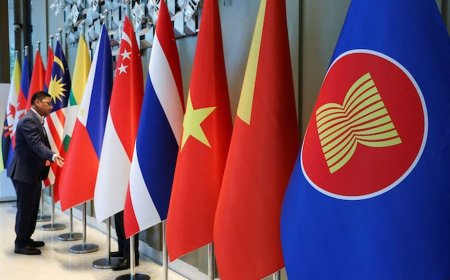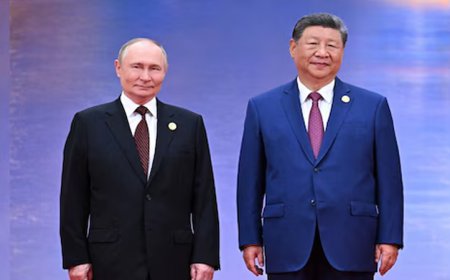Chinese Netizens Ridicule Trump’s Trade War Through Memes and Mockery
Chinese Netizens Ridicule Trump’s Trade War Through Memes and Mockery

China's Humorous Online Resistance to Trump’s Trade War
1. Strategic Response: Leadership vs. Netizens
-
While Chinese leaders engage in high-level economic and political countermeasures to challenge Donald Trump's trade war, Chinese internet users are waging a parallel battle online through satire and humour.
-
Social media users, armed with advanced AI tools, have launched a digital campaign mocking US trade policies and highlighting American reliance on Chinese goods.
2. Trade Tensions Escalate Between Superpowers
-
The US administration under Donald Trump imposed sweeping tariffs on Chinese imports, triggering reciprocal duties from Beijing.
-
These protectionist measures have intensified economic friction, destabilized global markets, and raised fears of a recession.
-
Trump claims these steps are aimed at reviving American manufacturing and correcting trade imbalances.
3. Online Satire Highlights Irony in US Rhetoric
-
Chinese netizens are leveraging AI-generated content to produce viral memes and videos mocking American criticism while showcasing its dependence on Chinese manufacturing.
-
Examples include:
-
Memes showing Trump and US Vice President JD Vance on Chinese assembly lines.
-
Videos of Americans humorously attempting to make their own shoes and phones.
-
Footage of a user opening his palms to show he buys "nothing" from the US.
-
4. Influencers Lead the Charge
-
A prominent social media personality, known online as "Buddhawangwang", has gone viral with videos criticising US policies and supporting Chinese nationalism.
-
Key details:
-
Originally from Liaoning province, he moved to California in 2019 but renounced his US green card.
-
He cited bias against China and "fake news" regarding Xinjiang as reasons for his disillusionment.
-
His content, which has received tens of millions of views, is accessible despite TikTok being officially blocked in China (via VPN use).
-
In one video, he says: "Donald Trump started a trade war, so... F** MAGA."*
-
5. Humour with a Nationalist Undertone
-
Videos emphasize the absurdity of the US trying to replicate Chinese manufacturing capacity.
-
Common themes:
-
AI-generated clips of overweight Americans failing to use sewing machines.
-
Posts mocking US officials for wearing or using products made in China.
-
Highlighting hypocrisy such as a White House press secretary’s dress traced to Taobao.
-
-
Popular online phrases:
-
"Attacking 'Made in China' is work; enjoying 'Made in China' is life."
-
"Two-faced behaviour. Don't wear it then, don't use it."
-
6. Satirical Trade Workarounds Go Viral
-
Some Chinese users on TikTok demonstrate how Americans can bypass tariffs by sourcing products directly from China.
-
One such video features a man in Yiwu city showcasing sandals resembling Birkenstocks for just $10.
-
Message: Despite trade restrictions, Chinese products remain affordable and in demand globally.
7. Expert Insights: Humour as Protest
-
According to Professor Gwen Bouvier from Shanghai International Studies University:
-
The content is not merely humorous but also politically charged.
-
It satirizes figures like JD Vance, who referred to “Chinese peasants,” and critiques broader US policy rhetoric.
-
Such satire serves as a nationalistic clapback while engaging in civic discourse.
-
8. Censorship and Underlying Concerns
-
Despite the online bravado, there is underlying concern over the long-term economic impact on China's export-driven economy.
-
However, Chinese internet censors tightly control public discourse:
-
Hashtags like “The United States will impose a 104% tariff on Chinese goods” are swiftly removed.
-
In contrast, narratives critical of the US, such as “America is fighting a trade war while begging for eggs”, receive massive traction—over 230 million views.
-
Conclusion: A Digital War of Words
-
The trade conflict between China and the US is not only playing out in diplomatic and economic circles but also in the arena of digital discourse.
-
Chinese social media users, through humour and satire, are playing a significant role in shaping public sentiment and international perception amid a high-stakes global standoff.
What's Your Reaction?



















































































